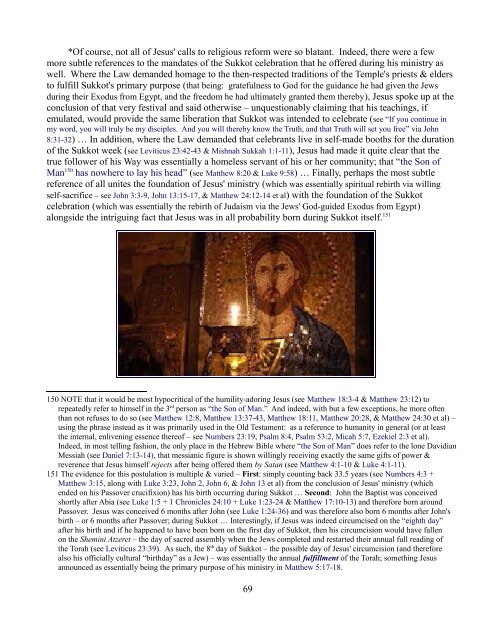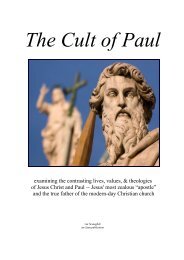Jesus Christ - a most Holy Heretic
An illuminating (and biblically exhaustive) examination of the little-known truth that Jesus Christ was not so much a supporter of the Old Testament laws of his day as he was a radically thorough reformer thereof
An illuminating (and biblically exhaustive) examination of the little-known truth that Jesus Christ was not so much a supporter of the Old Testament laws of his day as he was a radically thorough reformer thereof
You also want an ePaper? Increase the reach of your titles
YUMPU automatically turns print PDFs into web optimized ePapers that Google loves.
*Of course, not all of <strong>Jesus</strong>' calls to religious reform were so blatant. Indeed, there were a few<br />
more subtle references to the mandates of the Sukkot celebration that he offered during his ministry as<br />
well. Where the Law demanded homage to the then-respected traditions of the Temple's priests & elders<br />
to fulfill Sukkot's primary purpose (that being: gratefulness to God for the guidance he had given the Jews<br />
during their Exodus from Egypt, and the freedom he had ultimately granted them thereby), <strong>Jesus</strong> spoke up at the<br />
conclusion of that very festival and said otherwise – unquestionably claiming that his teachings, if<br />
emulated, would provide the same liberation that Sukkot was intended to celebrate (see “If you continue in<br />
my word, you will truly be my disciples. And you will thereby know the Truth, and that Truth will set you free” via John<br />
8:31-32) … In addition, where the Law demanded that celebrants live in self-made booths for the duration<br />
of the Sukkot week (see Leviticus 23:42-43 & Mishnah Sukkah 1:1-11), <strong>Jesus</strong> had made it quite clear that the<br />
true follower of his Way was essentially a homeless servant of his or her community; that “the Son of<br />
Man 150 has nowhere to lay his head” (see Matthew 8:20 & Luke 9:58) … Finally, perhaps the <strong>most</strong> subtle<br />
reference of all unites the foundation of <strong>Jesus</strong>' ministry (which was essentially spiritual rebirth via willing<br />
self-sacrifice – see John 3:3-9, John 13:15-17, & Matthew 24:12-14 et al) with the foundation of the Sukkot<br />
celebration (which was essentially the rebirth of Judaism via the Jews' God-guided Exodus from Egypt)<br />
alongside the intriguing fact that <strong>Jesus</strong> was in all probability born during Sukkot itself. 151<br />
150 NOTE that it would be <strong>most</strong> hypocritical of the humility-adoring <strong>Jesus</strong> (see Matthew 18:3-4 & Matthew 23:12) to<br />
repeatedly refer to himself in the 3 rd person as “the Son of Man.” And indeed, with but a few exceptions, he more often<br />
than not refuses to do so (see Matthew 12:8, Matthew 13:37-43, Matthew 18:11, Matthew 20:28, & Matthew 24:30 et al) –<br />
using the phrase instead as it was primarily used in the Old Testament: as a reference to humanity in general (or at least<br />
the internal, enlivening essence thereof – see Numbers 23:19, Psalm 8:4, Psalm 53:2, Micah 5:7, Ezekiel 2:3 et al).<br />
Indeed, in <strong>most</strong> telling fashion, the only place in the Hebrew Bible where “the Son of Man” does refer to the lone Davidian<br />
Messiah (see Daniel 7:13-14), that messianic figure is shown willingly receiving exactly the same gifts of power &<br />
reverence that <strong>Jesus</strong> himself rejects after being offered them by Satan (see Matthew 4:1-10 & Luke 4:1-11).<br />
151 The evidence for this postulation is multiple & varied – First: simply counting back 33.5 years (see Numbers 4:3 +<br />
Matthew 3:15, along with Luke 3:23, John 2, John 6, & John 13 et al) from the conclusion of <strong>Jesus</strong>' ministry (which<br />
ended on his Passover crucifixion) has his birth occurring during Sukkot … Second: John the Baptist was conceived<br />
shortly after Abia (see Luke 1:5 + 1 Chronicles 24:10 + Luke 1:23-24 & Matthew 17:10-13) and therefore born around<br />
Passover. <strong>Jesus</strong> was conceived 6 months after John (see Luke 1:24-36) and was therefore also born 6 months after John's<br />
birth – or 6 months after Passover; during Sukkot … Interestingly, if <strong>Jesus</strong> was indeed circumcised on the “eighth day”<br />
after his birth and if he happened to have been born on the first day of Sukkot, then his circumcision would have fallen<br />
on the Shemini Atzeret – the day of sacred assembly when the Jews completed and restarted their annual full reading of<br />
the Torah (see Leviticus 23:39). As such, the 8 th day of Sukkot – the possible day of <strong>Jesus</strong>' circumcision (and therefore<br />
also his officially cultural “birthday” as a Jew) – was essentially the annual fulfillment of the Torah; something <strong>Jesus</strong><br />
announced as essentially being the primary purpose of his ministry in Matthew 5:17-18.<br />
69

















